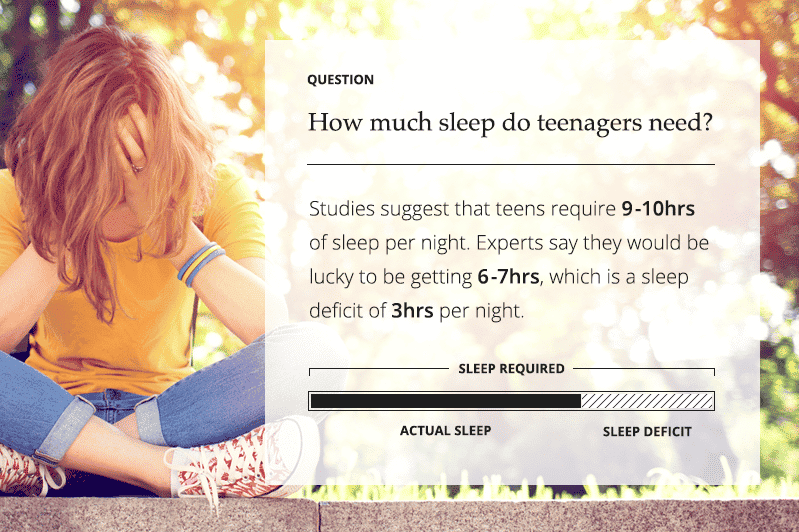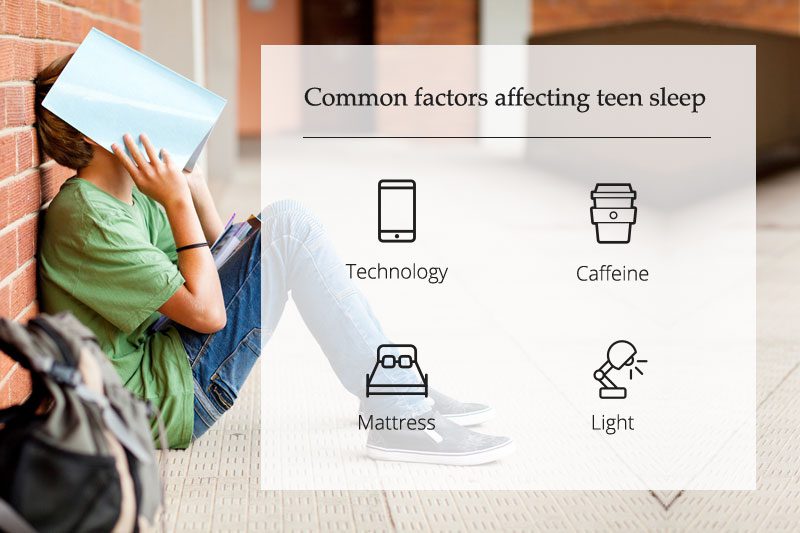
The teenage years are an exciting time as adolescents gain more independence and take on a busier life. However, one important thing that falls to the wayside during these years is adequate amounts of sleep. It seems like less sleep is to be expected, but how much do teenagers need and what happens when they don’t get it?
How much sleep do teenagers need?
According to the Victoria State Government, teenagers need 9–10 hours of sleep per night, which is more than an adult typically needs. Australian sleep expert Dr. Teng says that our teens are lucky to get 6–7 hours per night, meaning an estimated 3 hour sleep deficit per night, on average.
Causes of sleep deprivation in teenagers
During the teenage years, changes occur within the bioregulatory system controlling sleep. These changes include a delayed sleep onset, which means teenagers are often unable able to fall asleep until later in the night. This wouldn’t be problematic if they could sleep later in the morning; however, school schedules typically require teenagers to wake up early.
We interviewed Dr. David Cunnington, Sleep Physician and Director at the Melbourne Sleep Disorders Centre and co-founder of SleepHub, who said, “At the same stage of life that teens need more sleep, their lives are getting busier. They have increased study requirements, are beginning to have independent social lives and have a number of other extra-curricular activities such as sports.” He adds, “Screen time can also make an impact on sleep.”
More and more teenagers are using smartphones, tablets, televisions, and gaming consoles late into the night. The situation is reportedly made worse because 40% of students are self-medicating with at least two energy drinks per day.
Other causes of sleep deprivation include light
exposure and noise. If a teen’s room is too bright or noisy when they are trying to go to sleep, it can delay the onset of tiredness. In addition, if their mattress is uncomfortable, it can lead to tossing and turning throughout the night which prevents quality sleep.

The effects of sleep deprivation on teens
What is the impact of the sleep deficit in teens? Unfortunately, it has a ripple effect that impacts many aspects of life.
Studies have determined that sleep deprivation causes concentration problems, drifting off, memory impairment, a shortened attention span, moodiness, aggression, depression, risky behaviour, and clumsiness.
Dr Cunnington summed up the effects saying, “Getting sufficient sleep is a key to health at all ages, but particularly for teens. The teenage years are a time of emotional development … and lack of sleep makes emotions more unstable and can also lead to greater risk-taking. Teenagers are also usually studying, either at school or tertiary study, and sleep is critical to learning and memory. Staying up late to study instead of sleep may make teenagers feel they have got enough work done, but without sleep they won’t recall and understand what they have been studying as well.”
As you can imagine, this can greatly impact a teen’s daily life, performance and overall health, so proper sleep needs to be a priority during these years.
What teenagers can do to improve sleep
What can teens and their parents do to promote adequate sleep? Here are some tips.

Limit caffeine intake several hours before bed
Limit, or preferably eliminate, the intake of caffeine. It will disrupt normal sleep cycles and the quality of sleep overall. If you do consume caffeine, try to do so in the morning so it is less likely to keep you up at night. Remember caffeine isn’t just found in coffee and energy drinks—it can also be in sodas, protein bars, chocolate, ice cream, and tea just to name a few. You may also want to check for caffeine in the ingredients of any health food or energizing snacks you consume. Furthermore, be aware that some pain relief medication contains caffeine and even decaf coffee has a small amount.

Know your ideal bedtime
Be aware of what time a teen has to wake up and the ideal bedtime to get adequate sleep. Make an effort to move closer to the ideal hours of sleep required per night. Dr. Cunnington advises, “Recognise sleep as a priority, rather than an inconvenience, and allow adequate time for sleep through the school week.”

Sleep in when you can
Catch up on sleep in the mornings without scheduled activities. Dr. Cunnington suggests, “It’s helpful to allow time for catch-up sleep on the weekend.” Also be cautious when planning early morning activities that will further shorten a teen’s sleeping hours.

Limit technology before bed
Limit technology use 1–2 hours before bedtime. This includes but is not limited to smartphones, video games, television and tablets. The light from these devices and the stimulation can delay the onset of natural sleep.

Encourage naps
Take afternoon naps. If a teen is exhausted when they get home from school, it can be helpful for them to take a short rest. However, be mindful that if a nap is too long it may make it harder to fall asleep at bed time. It depends on the teen and how sleep deprived they are. Experiment with afternoon naps to see if they help a teen feel better during the day as well as to ensure they don’t disrupt sleep at night. When students reach university level, class schedules may allow even more opportunities for squeezing in some afternoon

Set up a bed time routine
Set up a relaxing bedtime routine and perform it every night. This could include taking a warm bath, drinking a caffeine-free calming tea like chamomile or ginger, and recreational reading.

Turn off the lights at bed time
Keep your room dark at bedtime as lights can disrupt your brain’s normal sleep-wake cycle. A common adversary to a dark bedroom is the television; however, it can also be lights outside your window that shine in. To help create a dark and undisturbed sleeping environment, both an eye mask and black out curtains can be helpful.

Check the quality of your mattress
Ensure your mattress offers proper support and comfort, allowing for sound sleep without tossing or turning. Not only can the wrong mattress leave you struggling to get into a comfortable position, it can also cause soreness and pain due to the misalignment of the spine. This makes it even harder to fall asleep.

Mind your sleep rules on weekends, too
Staying up too late on weekends can make it harder to fall asleep on time on weeknights. Of course, there will be social events that run later into the night for teens and they won’t want to miss out. However, it’s important to find a balance. Don’t stay up late every weekend night, particularly if nothing is going on that night. If you do stay up late, focus on getting to bed early the next night to get back on your normal schedule.
If you are a teen, or a parent of a teen, sleep needs to be a priority. Humans need more sleep during their teenage years than during any other time in their lives. Unfortunately, without it, all other areas of waking life can eventually suffer. So take the time to analyse your current sleep habits, or that of your teen, and identify what steps you can take to encourage adequate rest. As a result, you or your teen will be better rested and equipped to give life 100% in all areas.

